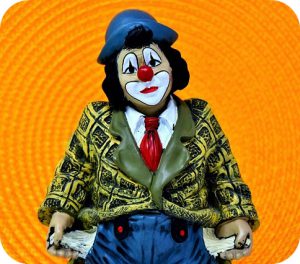 Way back in 2014, we looked at how changing tastes had led to declining interest in the art and business of clowning. Unfortunately for these red-nosed entertainers, matters haven’t improved much in the following years. In fact, 2017 may have marked an all-time low for American clowns. Not only did the Ringling Bros. circus shut down after nearly a century and a half in operation, but also McDonald’s ended its regional Ronald McDonald program. Without the work that these institutions once provided, modern clowns must now focus almost entirely on booking gigs at birthday parties or special events.
Way back in 2014, we looked at how changing tastes had led to declining interest in the art and business of clowning. Unfortunately for these red-nosed entertainers, matters haven’t improved much in the following years. In fact, 2017 may have marked an all-time low for American clowns. Not only did the Ringling Bros. circus shut down after nearly a century and a half in operation, but also McDonald’s ended its regional Ronald McDonald program. Without the work that these institutions once provided, modern clowns must now focus almost entirely on booking gigs at birthday parties or special events.
Of course, landing these jobs isn’t easy given that public perception of clowns has grown increasingly negative. First there was the “great clown scare of 2016,” an ominous trend in which groups of creepy clowns began gathering in various locations across the country. Then came It, the 2017 movie where the scariest clown imaginable terrorizes a group of children. As a result of this bad press, some clowns say they’ve been asked to stay away from places where they were once welcomed. “I’ve been told that ‘you can’t come to the hospital. You’ll scare people.’ That was really heartbreaking,” said Tricia “Pricilla Mooseburger” Manuel. “It’s diminished my income. The damage is done in so many respects. There’s a whole generation that, when they think of a clown, they think of something scary.”
According to an expert on coulrophobia (fear of clowns), the distress that some people feel may be related to the makeup that clowns wear. “The root of a lot of suspicion is the mask,” said USC professor Andrew McConnell Stott. “Why do you need to disguise yourself? It’s stranger danger.” Many clowns have adapted to this change by performing without makeup on. And while few clowns are happy about the current state of the industry, most are certain that their craft will endure this downturn. “Clowning will never be what it was, but I know it will continue to go on and on,” said Manuel. “We’ll survive the closing of the circus. We’ll survive scary movies. There’s something in the human spirit that wants to make people laugh and be happy. Once you do it, you have to do it — even though it might not be the popular thing.”
Questions:
- What can clowns do to counteract the negative perception that some people have towards them?
- Do you think clowning has a future in the U.S.? Why or why not?
